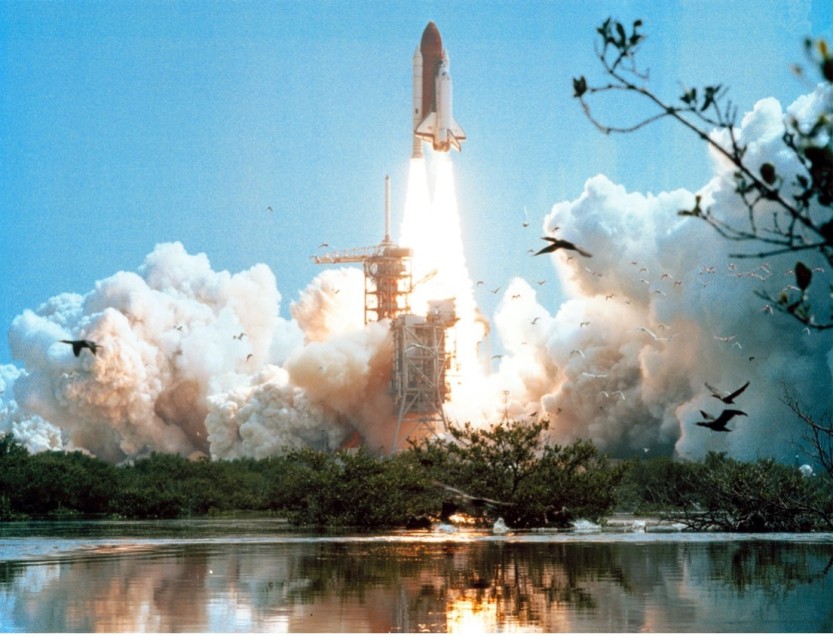
The year 2021 might be remembered as the year in which the space race gained a new lease of life. But rather than nation-states competing for global hegemony, it is being played out as a battle of private interests - namely, which corporation will hold the bragging rights of getting humanity back to the moon.
Following the largest bidding war in the history of spaceflight, in April Elon Musk's SpaceX overcame competition from defence contractor Dynetics and Jeff Bezos' Blue Origin (in partnership with Lockheed Martin and Northrop Grumman) to be awarded sole contracting rights by NASA to build the craft that aims to put astronauts back on the lunar surface within a decade, as part of its 'Artemis Program'.
Last month, both Virgin Galactic and Blue Origin successfully completed their first fully crewed test flights into suborbital space, representing a major milestone in the commercial space race and for their viability of launching commercial spaceflight services by next year.
Even so, both missions have also inspired criticism from those arguing that a 'billionaire space race' distracts from the real mission: the advancement of humanity, not just the stock prices of the ultra-wealthy.
However, this perspective fails to grasp the current climate of space exploration. As the dwindling funding to NASA has shown - which receives just 0.5 per cent of the US government's annual budget - when the aspiration of human spaceflight costs more than it rewards, the public sphere loses faith in farsighted visions.
The missing factor in the future of spaceflight is a private consortium, or public-private partnership, encompassing sufficiently wide-ranging mutual interests as to warrant risky investments across key projects for the future of humanity, such as asteroid mining, helium harvesting, and Martian terraforming.
Bezos made the need for this consortium clear in his response to NASA's decision: "Blue Origin will bridge the [Human Landing System] budgetary funding shortfall by waiving all payments in the current and next two government fiscal years up to $2bn [USD] to get the program back on track right now."
NASA will need to consider private interests if it is to achieve the high expectations of the Artemis program. The expedition is expected to cost USD 68 billion by 2025 towards a human lunar base, satellite launches, and freighters carrying crew and payloads to the Gateway, a moon-orbiting outpost from which surface missions will be staged.
The station will "rely on power and propulsion technology that has never before been used," much of which will be researched and developed in joint collaboration with international agencies, private labs, and universities across the world.
Government resources have been, and will continue to be, an important part of space exploration. Given the scale of the projects modern science is undertaking, it will be hard for humans to advance without the kind of scientific mobilization that only governments can muster. But that kind of spending can go even further in partnership with private institutions that bring their own unique strengths to the table.
The private sector can teach governments much about efficiency and agile growth, and their dependence on market forces can be mitigated or even removed entirely by state-led efforts to remove barriers to market entry.
As the speed and force of which the space tourism market has emerged reminds us, private sector investment must be celebrated for inspiring competition and innovation, helping to thrust us towards the stars. But overreliance on shareholders may threaten to become the industry's pitfall. Free markets are immensely powerful paradigms for progress - but can suffer from the need to make decisions according to questions of profit, rather than values and culture.
The pursuit of spaceflight both embodies and inspires a set of aspirational values. I am reminded of the people who built the Great Pyramids in Egypt, or terraformed arid land into rice fields over centuries. These early innovators knew they would be long dead before their work was finished but persevered with the conviction that their great-grandchildren would lay the final stones or plant the first seeds.
We must not lose that kind of inter-generational thinking today. A healthy society requires both level-headed industriousness and ambitious dreaming not only to survive, but to grow.
By working together, the continuous competitive pressures of both market and government will ensure we explore new frontiers while also being reminded of the global social impact of such expeditions. If humanity is eventually going to the stars, public-private partnerships will be an essential part of how future generations will get there.
By Mileson Guo
Mileson Guo is an entrepreneur and investor. He is the founder of The Institute for Emerging Technologies and Social Impact (ITSI)
ⓒ 2025 TECHTIMES.com All rights reserved. Do not reproduce without permission.




